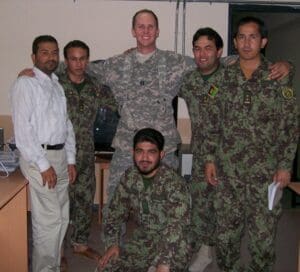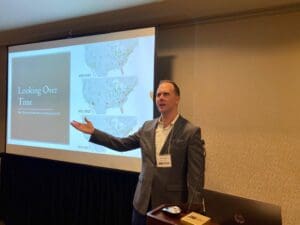 Jevon Gibb is Director of Research and Economic Development at the MetroHartford Alliance. He’s also a veteran, having served as an Attorney and Officer in the U.S. Navy. In honor of Veteran’s Day, MetroHartford Alliance Content Manager Nan Price spoke with Jevon about his career journey and the benefits veterans bring to private sector companies.
Jevon Gibb is Director of Research and Economic Development at the MetroHartford Alliance. He’s also a veteran, having served as an Attorney and Officer in the U.S. Navy. In honor of Veteran’s Day, MetroHartford Alliance Content Manager Nan Price spoke with Jevon about his career journey and the benefits veterans bring to private sector companies.
NAN PRICE: What types of challenges do veterans experience when returning to the workforce after deployment?
JEVON GIBB: The veteran experience is a more extreme example of the challenge facing many workers: It’s hard to pivot. For veterans, these are people with amazing experience—maybe you’re an 18-year-old who goes into the Navy or the Air Force and is suddenly responsible for multi-million dollar hardware or you’re suddenly responsible for large groups of people. These are dynamic people who have done significant work in high-pressure environments, most of whom are dedicated to the organization and getting the mission done. The challenge, though, is translating that experience into what comes next.
The veteran has to figure out how to reposition themself for the civilian workforce and companies have to understand how to leverage a veteran’s background. Because veterans often come from a very different background, this process is hard. You can’t apply cookie-cutter solutions. However, if you get it right, you have awesome people creating a lot of value for companies.
Again, this highlights the difficulty of any career pivot. It’s so much harder than some people assume. It takes creativity and vision to understand how to achieve your potential or how to elevate people to their potential. In a time where people move jobs so often and where lifetime employment isn’t guaranteed, this is a huge issue.
NAN: How can veterans’ skills be implemented into non-military workforce opportunities?
JEVON: It’s about appreciating all the soft skills and finding ways to leverage the hard skills.


Hard skills can be more difficult when there isn’t an obvious crossover. The impetus for finding that crossover should be on both sides. The veteran needs to adapt and to learn to do something new, but there’s also impetus on the employer to understand how to get the maximum value out of that person—and to understand the value that’s there.
I’m a big believer that veterans have done amazing work and they bring a lot of value. One of the challenges of any leader is to use empathy and management skills to elevate their staff. And it’s challenging to understand the experience and the value of veterans, especially for those who haven’t served.
The important thing is for employers to understand the amazing value veterans bring and then to have the creativity and vision to turn the submarine driver into the underwriter. Talent is a huge differentiator in business, so leaders need to do the hard work of figuring out how to elevate people to their new mission.


JEVON: I went into the U.S. Navy to do international law. I’m passionate about international development, but underneath that is economic opportunity. I wanted to work in places like Iraq and Afghanistan to figure out how to improve people’s conditions—or how to help people improve their own conditions. And, after failing to save the world in places like Afghanistan, this is my career pivot. I decided: I want to work on a regional scale in the United States. I wanted to take a lot of those skills I’d gained while serving and figure out how to apply them in a different environment and how to get my foot in the door.
Again, this was a big career pivot for me. As I started looking at opportunities, people said, “You were in the Navy doing international law. Do you really understand regional economic development?” And my response was: Yes.
Understandably, there’s a bit of dubiousness because I hadn’t done this and, again, it takes understanding to figure out how to take my background and elevate it. On the flip side, it’s been my challenge to figure out how to prove that and how to rebuild my career in a different space.
That’s the challenge of career pivots we talked about earlier. So, on Veteran’s Day, if someone is wondering how to support a vet, I’d say to help them with this pivot. Be a mentor. Hire them. Help them understand their “fit” in the private sector. Help elevate them to their potential. Veterans make incredible sacrifices for our country. They can continue doing amazing work in the private sector. Let’s work together to make it happen.
Photos:
MetroHartford Alliance Director of Research and Economic Development Jevon Gibb
Lieutenant Jevon Gibb with his Afghan colleagues at Kabul Military Training Center, Afghanistan
